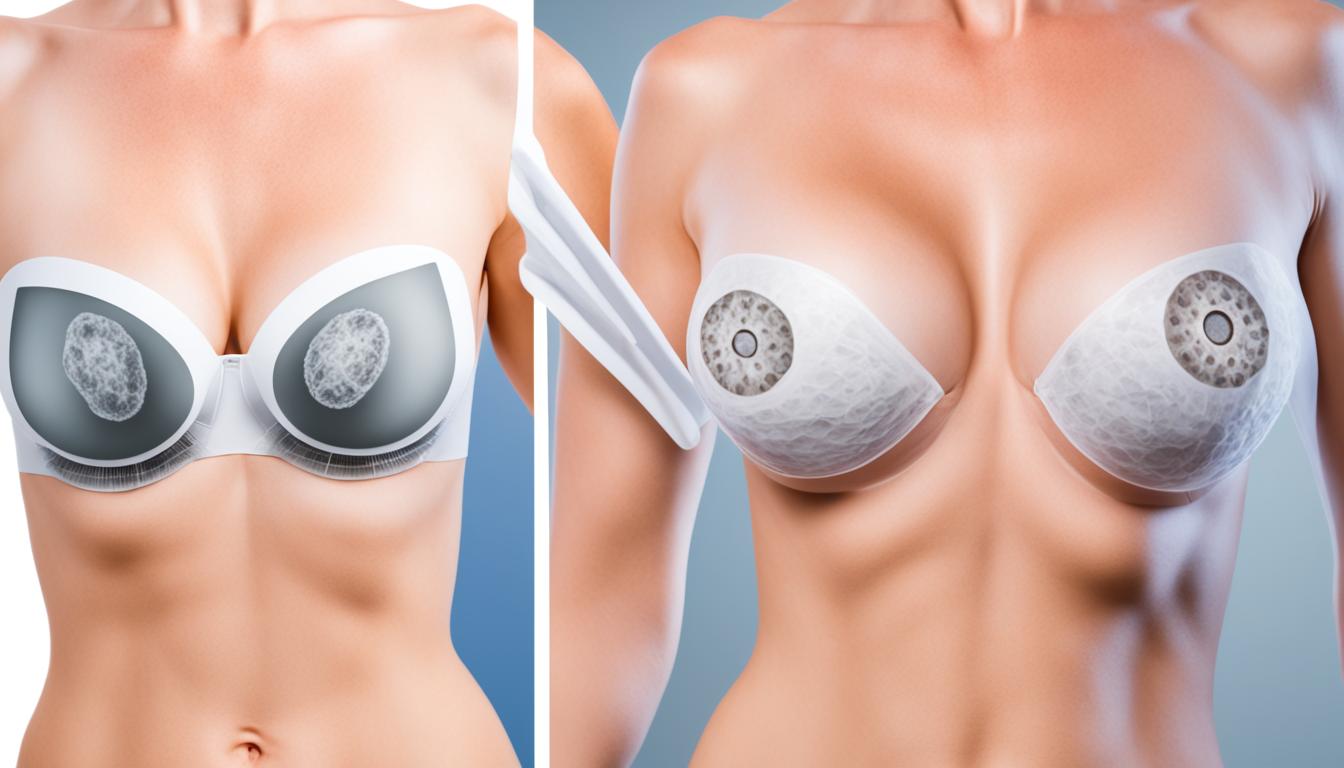Being a woman who chose breast augmentation, I know the mix of feelings it brings. There’s a lot of excitement but also worry. This decision changes our lives. We all aim to feel good about ourselves.
Yet, I often worry about how my choice could affect future health checks. This includes how my implants might change my mammogram results. I’ve always wondered about this.
You might be thinking the same: “Does breast enlargement surgery mess with mammograms?” It’s a valid worry. Both saline and silicone implants could make mammogram results less clear. This could affect finding cancer early. In this article, we look into this issue. We’ll talk about how implants can affect mammograms, give advice on getting mammograms with implants, and clear up some myths. Understanding the challenges and solutions helps us protect our breast health. It also ensures any problem is found early.
Key Takeaways
- Breast implants, both saline and silicone, can obscure breast tissue during mammogram screenings, making it more difficult for radiologists to obtain a clear view.
- Specialized techniques, such as implant displacement views, are used to improve the visualization of breast tissue around the implants.
- Regular mammogram screenings are still recommended for women with breast implants, starting at age 40 or earlier if there are other risk factors.
- Choosing a mammography facility with expertise in working with patients who have had breast augmentation surgery is crucial for an accurate and comfortable screening experience.
- Breast implants do not increase the risk of breast cancer, but they can present challenges in detecting abnormalities during mammograms.
Introduction to Breast Implants and Mammograms
Breast implants come in saline or silicone types. They are popular for making breasts larger. But, having these breast implants can make mammograms less accurate. Mammograms are vital for finding breast cancer early. The American Cancer Society says all women should get a mammogram each year, starting at age 40, even if they have breast implants.
Importance of Annual Mammogram Screening
Mammograms are key for women with breast implants. They can find any unusual parts or changes in the breast. These could show there’s breast cancer. In spite of the challenges with the implants, keeping up with yearly mammograms is critical for looking after your breast health.
Types of Breast Implants: Saline and Silicone
Silicone and saline are the main breast implant types out there. Both can make it hard for mammograms to see all the breast tissue. The implants show up as solid, white shapes on the scans. It’s important to know about saline and silicone implants. Knowing the effect they have on mammograms helps ensure you get the best breast cancer checks possible.
Do Breast Implants Increase Breast Cancer Risk?
Some people think breast implants raise the chance of breast cancer. But studies show the opposite. Women with implants actually get breast cancer less often than those without.
No Increased Risk from Implants Themselves
It’s clear that breast implants, be they saline or silicone, don’t up your breast cancer risk. Getting older, having certain gene changes like BRCA1 and BRCA2, and family history play a bigger role in increasing risk.
Genetic and Lifestyle Risk Factors for Breast Cancer
It’s important for women with implants to keep up with breast cancer checks. Just like other women, they should start getting mammograms at age 40. But they might need them earlier if they have extra risk, like genetics or lifestyle choices.
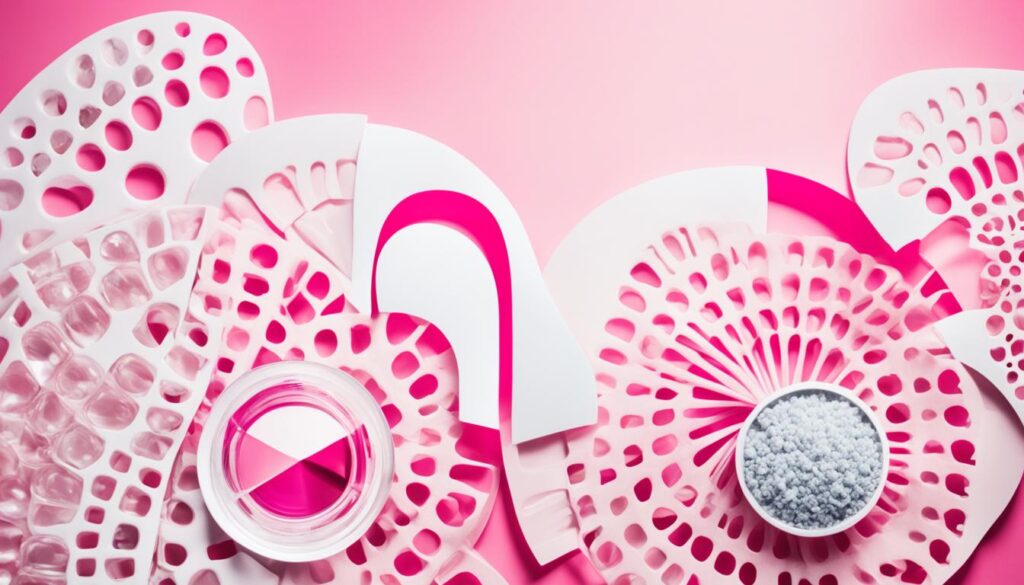
Can Breast Enlargement Surgery Affect Mammogram Results?
Breast implants, whether saline or silicone, don’t increase breast cancer risk. Yet, they can affect mammogram results. They may cover up to 50% of breast tissue on images, making it harder for radiologists to see details.
Implants Can Obscure Breast Tissue in Mammograms
Radiologists find it tough to see the entire breast when implants are present. The implant material can hide or blur the image of the real breast tissue. This makes spotting suspicious changes, like those linked to breast cancer, more difficult.
Implant Placement: Under or Over the Muscle
Where the implants sit under the skin matters too. Placing implants under the chest muscle is better for clear imaging. This is because it’s closer to the chest wall and doesn’t hide as much breast tissue when being imaged.
Special techniques like implant displacement views help improve imaging with implants. In this method, a technologist pushes the implant back and pulls the breast forward. It enhances the clear view of the hidden tissue.
Mammogram Guidelines for Women with Implants
Breast implants can make mammograms tricky, but the advice is clear. Women with or without implants should get a mammogram every year. This starts at age 40, recommended by the American Cancer Society and others.
Follow Standard Annual Screening Recommendations
If you’re at higher risk for breast cancer, you might start screenings earlier, even at age 30. Having breast implants, though, doesn’t mean you’re at more risk. Thus, regular mammograms are key for all women, including those with implants, to catch any issues early and take care of their breast health.
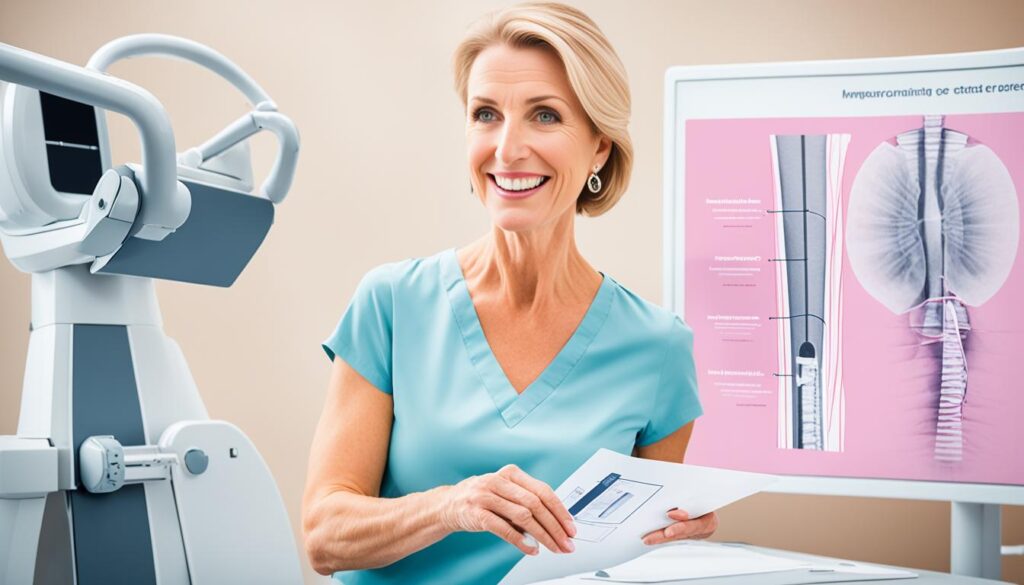
Specialized Mammogram Techniques for Implants
Radiologists and technicians use special methods for mammograms with breast implants. Besides the regular views, they take four more pictures, known as implant displacement (ID) views. With these ID views, the technologist moves the implant back and the breast tissue forward. This helps see through the implant to the breast tissue better.
Implant Displacement Views
The implant displacement views play a key role in mammograms for women with implants. They improve the radiologist’s view of the breast tissue around the implant. This clear look is vital for catching any issues early.
Additional Images for Better Visualization
Technologists may also capture extra images to cover all the breast tissue around the implant. Taking these extra pictures ensures a full and correct view of the breast’s health. Even with implants, these steps help in a thorough examination.
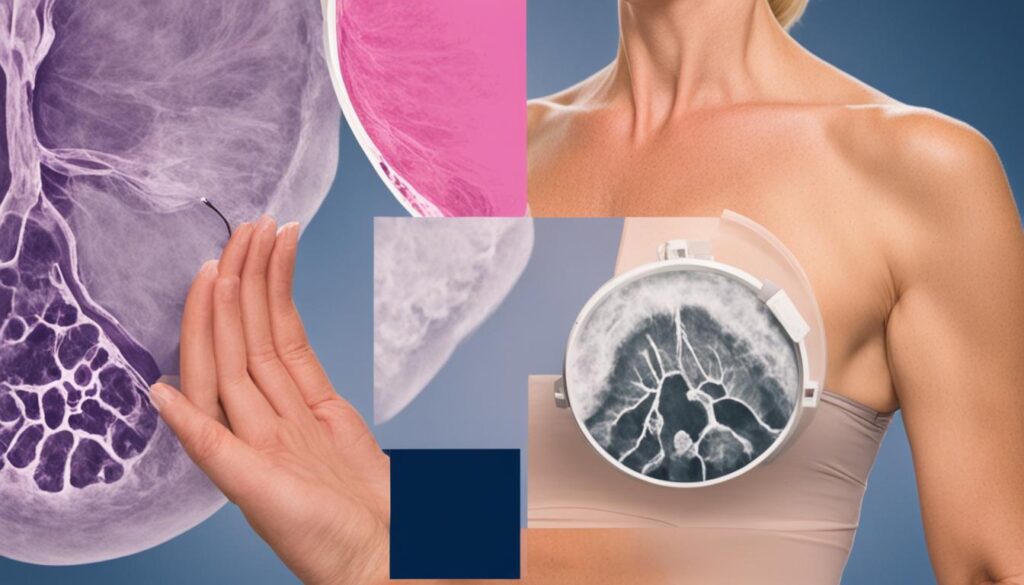
Minimizing Risks During Mammograms with Implants
Getting a mammogram with breast implants is safe, even though it’s a bit different. The main worry is implant rupture during the test. But, it’s very rare for this to happen during a mammogram.
Inform Technologist About Implants Beforehand
Telling the mammography technologist you have breast implants is very important. This helps them use special methods. They make sure the breast is seen well without hurting the implants.
Rare Risk of Implant Rupture During Compression
There’s a small risk of implant rupture during a mammogram if you have breast implants. By talking to the technologist, you can lower this risk. They’ll use methods that keep your implants safe while getting clear results.
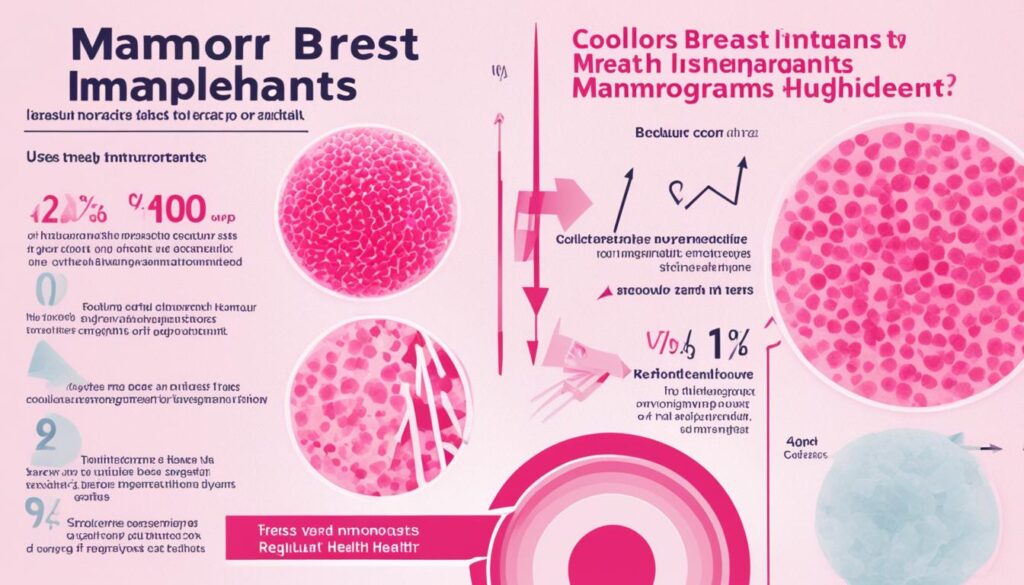
Breast Cancer Screening Options Beyond Mammograms
Mammograms are the main way to screen for breast cancer. Yet, some women might benefit from other tests. This is true for those with breast implants or dense breast tissue. For them, adding a breast ultrasound to their screenings can be very helpful.
Breast Ultrasound for Dense Breast Tissue
Unlike mammograms, ultrasounds don’t use radiation. They give detailed images of breast tissue without any harm. A breast ultrasound can help see through dense breast tissue where mammograms might miss something.
For some, more exams may be needed. Like an MRI, it offers even more details. This is especially true for women whose doctors worry more about their risks or who have dense breasts.
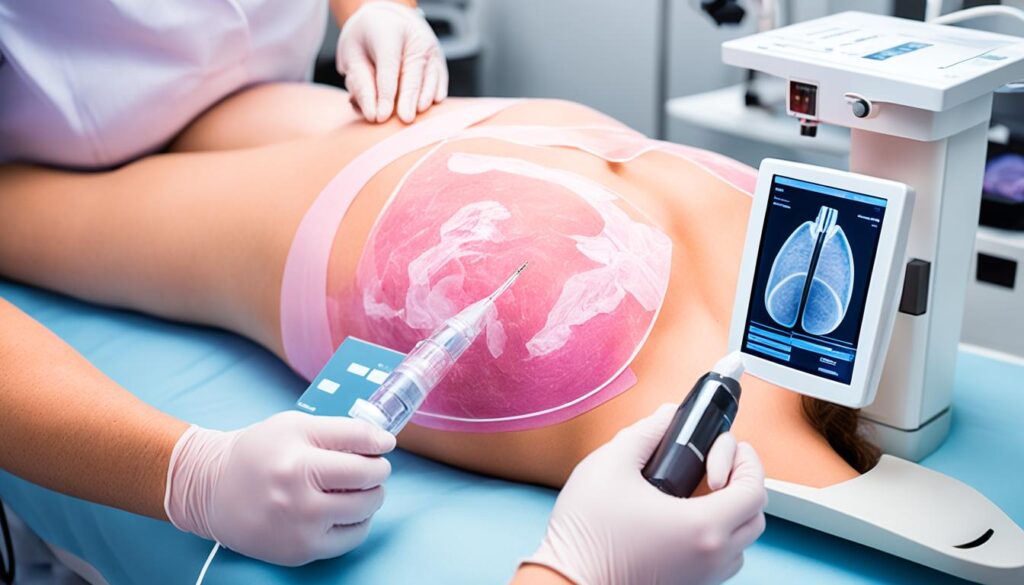
Knowing your extra screening choices can lead to a better, personalized prevention plan. This is especially important for women with breast implants or dense breast tissue. Working closely with healthcare experts helps make sure you’re doing what’s right for your breast health.
Choosing a Mammography Facility with Implant Expertise
As a woman with breast implants, picking the right mammography facility is vital. You need a place that is very experienced in working with patients like you. They should have techs who know exactly how to get the best pictures, including views to look at your implants.
It’s also key that the facility has the right kind of imaging tools and techniques. This reduces risks to your implants when they’re compressed for the mammo. Talk to your doctor about finding a mammography facility known for top-notch care for women with breast implants. This will help your screening be both accurate and as comfortable as possible.
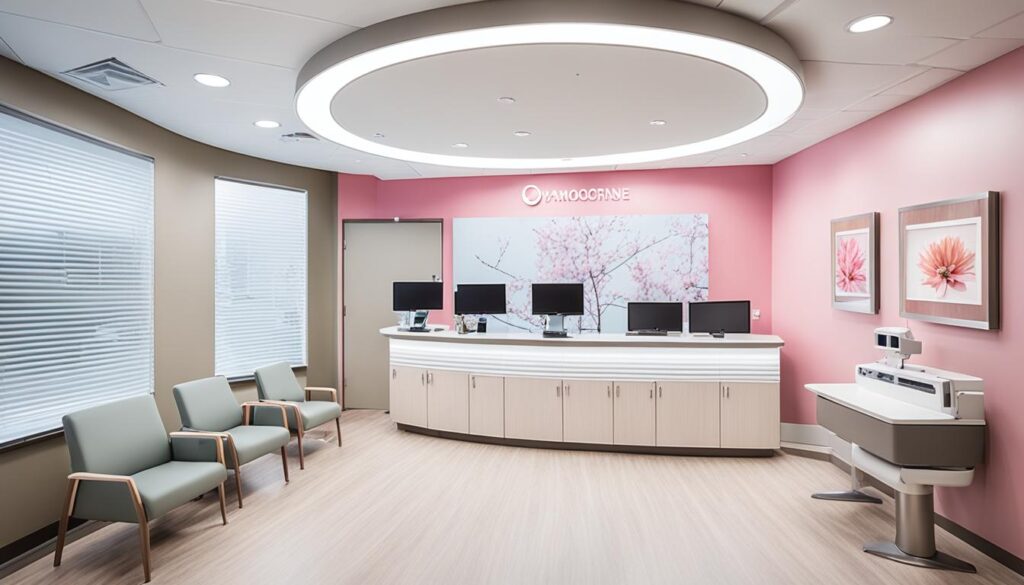
Choosing a mammography facility with the right specialized expertise is critical. Doing research and getting recommendations from your doctor will help. This way, you’ll find a place that understands your needs well.
Addressing Concerns and Misconceptions
Some women with breast implants might worry about getting mammograms. They fear that mammograms could harm their implants or not give accurate results. Yet, it’s vital for all women to follow the yearly mammogram guidelines, even if they have implants.
Importance of Regular Screening Despite Implants
Having breast implants, be they saline or silicone, doesn’t up your breast cancer risk. Mammograms might be hard to read because of the implants. But, there are ways to get a clear view.
Rupturing an implant during a scan is super rare. Knowing this can help any woman with implants keep up with her breast health checks.
Implants Do Not Cause Breast Cancer
Some people think that breast implants could lead to getting breast cancer. But, studies always show that having implants doesn’t raise this risk. The main things that can raise your chance of breast cancer are your age, family history, and life choices. The implants by themselves don’t change much about this.
So, it’s still very important to get regular mammograms, even if you’ve had breast surgery. They’re key for spotting any issues early.
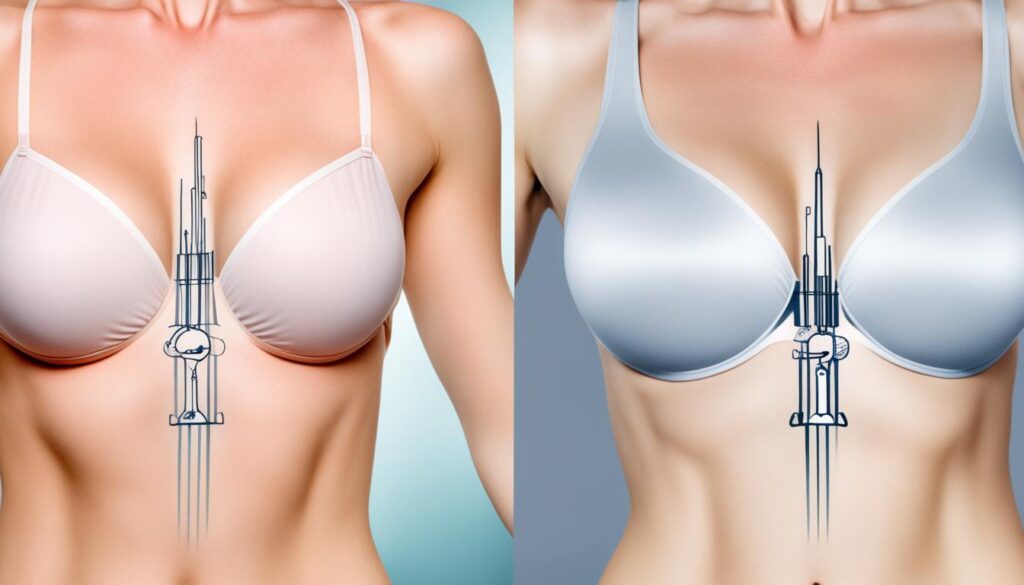
Consulting with Your Healthcare Provider
If you’re thinking about getting breast implants, talk to your healthcare provider first. It’s essential to discuss how they might affect your breast cancer screening. Your healthcare provider will explain the risks and benefits of mammograms for women with breast implants. They will also mention any special screening options available for you. These can depend on where the implants are, how dense your breast tissue is, and your breast cancer history.
Discussing Risks, Benefits, and Screening Options
Working with your healthcare team ensures you make smart choices about your breast health. They will help you get the best breast cancer screening. You may need extra tests like a breast ultrasound or MRI aside from yearly mammograms. This way, you get a thorough check on your breast health, especially with breast implants.

Talking openly with your doctor is critical. They’ll explain all the risks and benefits of various screening options. Together, you will create a plan to focus on your breast health. With their knowledge and help, you can take the right steps early to stay healthy.
Conclusion
Breast implants, whether saline or silicone, can cause issues during mammogram screenings. They might hide parts of breast tissue. This can make it hard for doctors to see everything. But, women with breast implants should still get regular mammograms.
To get the best results, women can use special techniques. These include implant displacement views. They should also make sure the technicians are experienced. This way, they can catch any problems early.
It’s really important for women to know how implants can affect mammograms. By keeping up with tests, they can stay ahead of any problems. They should always follow the advice for when to get screenings.
Talking to a doctor who understands the special needs of women with implants is key. They can help make a good breast cancer screening plan. This plan will include the right tests at the right times.
